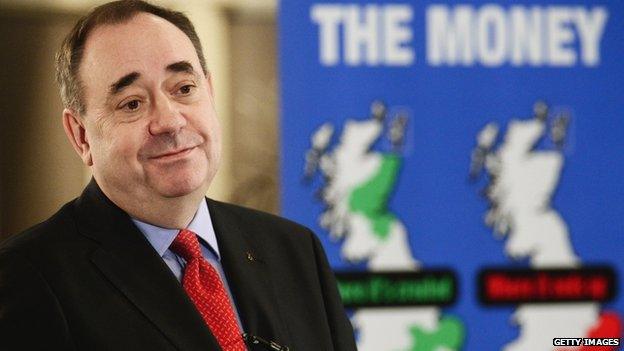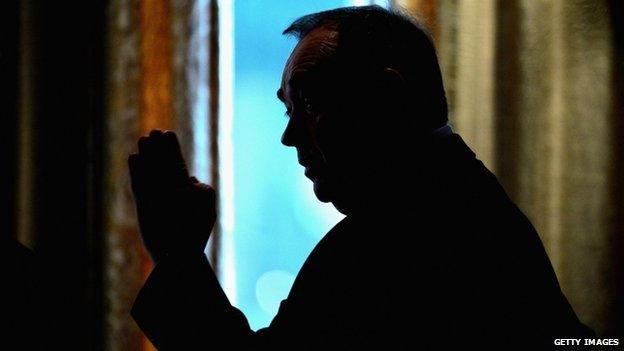Scottish independence: Currency union block could hurt firms, says Alex Salmond
- Published
- comments
Alex Salmond outlines four "points of real importance" in the independence debate
Blocking an independent Scotland's ability to share the pound could damage business in the rest of the UK, First Minister Alex Salmond has said.
Mr Salmond said the UK Treasury could impose "hundreds of millions of pounds" in costs on firms if plans for a post-Yes currency union were rejected.
Last week Chancellor George Osborne said a vote for independence meant walking away from the pound.
Prime Minister David Cameron said Mr Salmond was "a man without a plan".
The row came ahead of the 18 September independence referendum, in which voters in Scotland will be asked the Yes/No question: "Should Scotland be an independent country?"
Mr Salmond hit back at Mr Osborne during a speech in Aberdeen, as he published Scottish government analysis, external which said that a separate Scottish currency under independence could mean £500m in transaction costs for the rest of the UK.
He said the bill would be incurred by industry and customers wanting to import and export from an independent Scotland.
The first minister said Mr Osborne had downplayed the disadvantages to the rest of the UK from a sterling zone.
"He said you don't need to be in a currency union to trade with other countries. No you don't. But it can impose a cost - a big cost," he said.
"I am publishing today an estimate of the transactions cost he would potentially impose on businesses in the rest of the UK.
"They run to many hundreds of millions of pounds."
Mr Salmond added: "My submission is that this charge - let us call it the George tax - would be impossible to sell to English business.
"In fact if you remove oil and gas from the equation, Scotland is one of the very few countries in the world with which England has a balance of trade surplus."
Mr Osborne's position that he could not support the Scottish government's currency union plan was backed by the other two main Westminster parties, Labour and the Liberal Democrats.
Mr Salmond said "attempts to dictate from on high" the terms of the debate were damaging the democratic process.

Alex Salmond said Westminster ministers downplayed the disadvantages to the rest of the UK from a sterling zone

Mr Salmond said the "George tax" would be impossible to sell to English businesses
He said Mr Osborne's position was not an economic assessment, but a "campaign tactic", adding that the "accumulated negativity" of the campaign to keep the Union, would "differ greatly from the reality of life" after the referendum.
The Scottish first minister said: "To be told that we have no rights to assets jointly built up is as insulting as it is demeaning.
"To be told there are things we can't do will certainly elicit a Scottish response that is as resolute as it is uncomfortable to the 'No' campaign.
"It is, 'yes we can'. It is a sign of just how out of touch and arrogant the Westminster establishment has become."
In response, Mr Cameron said the first minister had not delivered on his promise of a detailed response to the arguments put forward by Mr Osborne.
"Alex Salmond is now a man without a plan," said the Prime Minister.
"He told us he wanted to have a currency union and that now looks under threat.
"He's told us that he wanted Scotland as part of the European Union - that is under threat."
Mr Cameron added: "And he's making, I think, quite an empty and rather angry speech today - but he hasn't got a plan and I think people will see he hasn't got a plan."
David Cameron: ''Alex Salmond is now a man without a plan''
Mr Salmond's speech also came after European Commission President Jose Manuel Barroso cast doubt on Scotland's membership of the European Union in the event of a "Yes" vote.
Mr Barroso said it would be "extremely difficult, if not impossible" for an independent Scotland to join and that it would have to apply for membership and get the approval of all current member states.
But the first minister said the EU had admitted so many countries that a "pragmatic way" would be found in the case of Scotland.
Mr Salmond said no member state had suggested it would seek to block an independent Scotland from becoming an EU member.